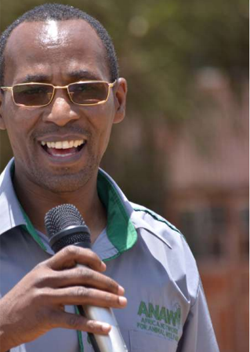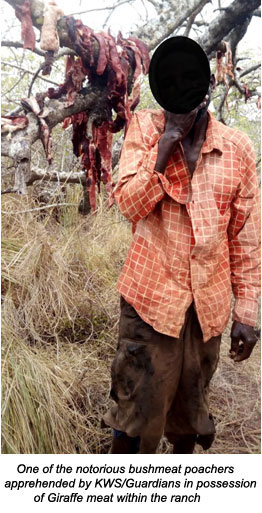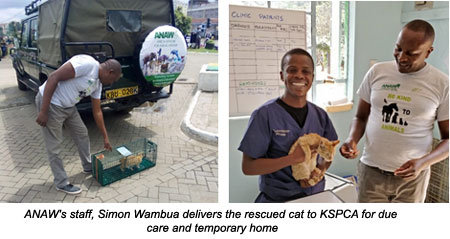May to June 2020
Executive Director’s Message
 Dear Partner, Dear Partner,
It is my sincere hope that you and your families are doing fine and keeping safe amid the Covid-19 pandemic.
It is always a pleasure for me to share with you our periodical work achievements geared at promoting humane treatment of all animals.
As you might be aware, we continue to experience diverse animal welfare challenges and ANAW and her partners have been at the frontline in addressing and mitigating these challenges through our various programs..
In the last two months, we have endeavoured to address; the rising demand for bushmeat occasioned by the effects of Covid-19 pandemic, even as communities try to obtain cheap meat and how we are tackling the challenge; the egg-laying season for turtles and how our team is helping create awareness on the need to conserve these precious species; the rescue of a lonely cat in a petrol station that was almost exterminated, but given another chance to live; how we have worked with partners to gain knowledge on disaster preparedness especially in saving animals in times of natural calamities; the new ANAW Network Program which aims at providing a platform for all partners interested in advocating for and ensuring the best care and protection for all animals.
Finally, we let you into our staffroom, to see #FacesOfANAW. In this section, we will be briefly profiling one of our staff members to give you an opportunity to experience how it is to work at ANAW and our shared values in protecting our animals!
Please read on and, as usual, give us your comments and feedback.
Thank you for your partnership in helping us alleviate the suffering of Africa’s animals.
Sincerely,
Josphat Ngonyo.
|
Kasighau ANAW-Supported Wildlife Guardians Help in the Arrest of a Bushmeat Hunter
 The months of May and June have been extremely busy for ANAW Wildlife Scouts as they conducted 63-day and 2-night patrols within the 52,000-acre Kasighau Ranch. With help from local informants, the wildlife guardians received intelligence reports of more than six incidences relating to bushmeat hunting within the ranch, for the last two months. The months of May and June have been extremely busy for ANAW Wildlife Scouts as they conducted 63-day and 2-night patrols within the 52,000-acre Kasighau Ranch. With help from local informants, the wildlife guardians received intelligence reports of more than six incidences relating to bushmeat hunting within the ranch, for the last two months.
Significantly, on June 20, through the Kenya Wildlife Service (KWS) rangers, the wildlife guardians helped in the arrested of one notorious bushmeat hunter in possession of wet carcasses of three dik-dik antelopes inside the ranch. The hunter was allegedly the main supplier of eland, warthog, giraffe, and buffalo meat to several bushmeat rackets in seven villages located around the ranch.
It is prudent to note that the expansive community property is a critical seasonal wildlife dispersal area between three contiguous national parks, namely: Kenya’s Tsavo East, Tsavo West and Tanzania’s Mkomazi.
Earlier on in the month of May, a middle-aged man hunting in the ranch, and being in possession of three (3) kilograms of bushmeat believed to be of a Lesser Kudu was arrested by KWS rangers through the help of the guardians.
It is noted with concern that hunting for wildlife bushmeat has escalated since the onset of Covid-19. The rackets have intensified their cruel methods of animal hunting that inflict untold suffering to many animal victims, to meet the high demand of cheap meat in form of illegal bushmeat. The ranch management recently consolidated the scouts’ workforce (for which ANAW-supported guardians are part of) for effective response to the growing threat exacerbated by both poverty and the prevailing pandemic.
One of the challenges encountered in apprehending and prosecuting bushmeat hunters lies in the irony that the animal anti-cruelty law in Kenya is not usually applied on bushmeat hunting court cases. The penalties are almost always severe, but the evidence is impossible to present as proof in a court of law.
In this regard and going forward, ANAW is seeking to increase the advocacy for use of Kenya’s CAP 360 on illegal wildlife hunting cases, especially where the suspect confesses to guilt of hunting an animal victim.
|
A Cat Unwanted at the Petrol Station; Embraced at the KSPCA Facility

On June 11, 2020, the ANAW rescue team got information of a male sub adult abandoned cat that had been residing in a Total Petrol Station along Ngong Road, a few kilometers outside Nairobi’s capital, that was in a verge of being killed since the management did not want the stray cat in their premises, and had threatened to exterminate it.
ANAW Team rushed to the facility and were able to rescue the cat from the management before the knife fell on it, and successfully captured and delivered the cat to Kenya Society for the Protection and Care of Animals (KSPCA) for due care and a temporary home before rehoming.
The rescue team had a session with the Total Petrol Station management team before taking away the cat and was able to sensitize them on how and where to report such cases in future.
|
Protecting Animals During Disasters
Participating in a webinar session hosted by its partner World Animal Protection (WAP) on protecting Animals during disasters, the session facilitated by Dr Judy Kimaru, Animals in Disasters Campaign Manager at WAP, noted that Africa was increasingly getting exposed to various natural calamities, particularly those arising from hydrometeorological hazards such as floods, drought, and cyclones. When they occur, saving people’s lives was the priority, but protecting animals always came a distant second.
It was, therefore, because of this unfortunate reality that WAP had launched a free online course dubbed PrepVet (Veterinary Preparedness) on animal disaster management to equip animal care givers and veterinarians with knowledge and skills on what to do before, during and after a disaster.
The course has 13 different modules that one must go through before earning a certificate. The modules include animal welfare, animal evacuation process, safety in emergencies, search and rescue of animals among other modules.
One of ANAWs veterinary doctors, Dr Janerose Mutura, took part in the course and was awarded a certificate upon completion. The knowledge and skills acquired during the study would be key to helping save animals in the eventuality of any future disaster.
|
Coastal Residents Sensitized on Turtles Conservation as Egg-Laying Season Gains Momentum
 ANAW’s Turtle Rescue Program team in Kenya’s Diani Beach on the shores of Indian Ocean have been relatively busy for the last two months as turtles’ egg-laying season gained momentum. During the two-month period, the team recorded a total of 45 new nests. 18 of the nests were original while the other 27 were relocated, hence recording a total of 3,314 hatchlings. ANAW’s Turtle Rescue Program team in Kenya’s Diani Beach on the shores of Indian Ocean have been relatively busy for the last two months as turtles’ egg-laying season gained momentum. During the two-month period, the team recorded a total of 45 new nests. 18 of the nests were original while the other 27 were relocated, hence recording a total of 3,314 hatchlings.
Unfortunately, one turtle’s carcass was found dead on the shores of the ocean in Chale region having been swept off to the shore by the currents. The cause of death was not immediately established but the team is still investigating what might have happened to avert a similar incident in future.
One of the ANAW-supported turtle rescuers, Saidi Hamisi Mwaito in the company of Kenya Wildlife Service (KWS) agents, took some time in his routine patrols to create awareness among the coastal residents on the importance of conserving turtles and not harming them, especially during the Covid-19 pandemic season.
|
Have You Joined ANAW Network Membership Program?

ANAW is excited to announce rolling out of a network membership program aimed at providing a platform for all friends and partners interested in advocating for and ensuring the best care and protection for all animals. The program’s membership consists of individuals, institutions, corporate companies, civil societies and other stakeholders across the African continent.
Some of the core functions of the Network Membership Program would be to: engage in initiatives for the development and/or implementation of animal welfare standards; provide support in implementation of relevant projects and activities in collaboration with relevant partners; play an advocacy role on matters relevant to animal welfare including increased engagement with communities, government, partners, public and private sector among other functions.
Similarly, some of the benefits of becoming an Network Member would be: possibility of creating collaborations for policy change; access to publications e.g. newsletters, magazines, videos; platform for sharing information and networking; participation opportunities in activities campaigns, workshops and conferences; subsidized rates on merchandise; free subscription of newsletters, annual reports and online consultation and opportunities for individual, professional or academic volunteer-ships among other benefits.
For you to become a member, you will be required to fill out the online application form on our website and send it back alongside a membership subscription confirmation receipt or pledge for subscription.
We are looking forward to you joining the Network and to being part of the change agent impacting animal welfare, wildlife, and environmental conservation.
For more details about the program, kindly click on this link or write to us on: This email address is being protected from spambots. You need JavaScript enabled to view it. or give us a call on +254 798 452 625.
|
Faces of ANAW
Staff featured: Edith Pendo Ogada
 1. What is your current position? 1. What is your current position?
Development Manager and the Personal Assistant to the Executive Director.
2. What does your work entail?
I facilitate teams (local and international) visiting the ANAW programs; arrange for their transport and accommodation needs. Coordinate logistics for major projects and events e.g. the annual Africa Animal Welfare Conference. I oversee the organization’s network membership program to maintain local and international relations with network members across the world geared towards synergy creation in promoting animal welfare.
As the PA to the Executive Director (ED), I manage the day-to-day administrative operations of the office. I keep the ED’s official diary for planning and scheduling of meetings/appointments.
3. What do you love about working at ANAW?
Having worked at ANAW for more than 10 years, I can confidently say that the organization’s working environment is great and very accommodating. When you work for ANAW, you find growth. There were certain skills that I did not know I had, but the conducive environment at ANAW enabled me to identify, nurture and grow them immensely for both organizational and personal development.
4. Do you personally believe in the cause of animal welfare?
Yes, I greatly do. I believe in being the voice and the advocate for the voiceless. Seeing that animals are humanely treated is something that is very dear to my heart. Even my Christian religion embraces animal welfare – ‘The righteous care for the needs of their animals’ (Proverbs 12:10).
5. Has the value system of treating all animals humanely influenced you?
Yes, it has. I feel bad when I see someone hitting a donkey that is already carrying a heavy load, or when I see someone carrying a chicken with the head facing down. I am more aware than I was before joining ANAW, that animals are sentient beings - have the same feelings as I do, and I treat them with more care and encourage those around me to do the same.
6. What do you love doing during your free time?
I love to sing and listen to music. I love Christian music.
7. Describe your best moment in the time you have been at ANAW.
My best moment so far, has been seeing ANAW and her partners successfully carry the annual Africa Animal Welfare Conference beyond Kenyan borders.
|
|
Support Our Work
Here's a great way to support Africa Network for Animal Welfare (ANAW) and enable us to protect future generations of animals. You can do so through the following ways:
Through Donation
You can support our work by donating online through our secure online platform using a credit card.
Make a Donation
Leave a Legacy in Your Will
By putting a bequest to ANAW in your will or trust, you will help us to improve the lives of animals far beyond your lifetime. Contact Purity at This email address is being protected from spambots. You need JavaScript enabled to view it. if you need additional information about how to include us in your will.
|

 Dear Partner,
Dear Partner, The months of May and June have been extremely busy for ANAW Wildlife Scouts as they conducted 63-day and 2-night patrols within the 52,000-acre Kasighau Ranch. With help from local informants, the wildlife guardians received intelligence reports of more than six incidences relating to bushmeat hunting within the ranch, for the last two months.
The months of May and June have been extremely busy for ANAW Wildlife Scouts as they conducted 63-day and 2-night patrols within the 52,000-acre Kasighau Ranch. With help from local informants, the wildlife guardians received intelligence reports of more than six incidences relating to bushmeat hunting within the ranch, for the last two months.
 ANAW’s Turtle Rescue Program team in Kenya’s Diani Beach on the shores of Indian Ocean have been relatively busy for the last two months as turtles’ egg-laying season gained momentum. During the two-month period, the team recorded a total of 45 new nests. 18 of the nests were original while the other 27 were relocated, hence recording a total of 3,314 hatchlings.
ANAW’s Turtle Rescue Program team in Kenya’s Diani Beach on the shores of Indian Ocean have been relatively busy for the last two months as turtles’ egg-laying season gained momentum. During the two-month period, the team recorded a total of 45 new nests. 18 of the nests were original while the other 27 were relocated, hence recording a total of 3,314 hatchlings.
 1. What is your current position?
1. What is your current position?